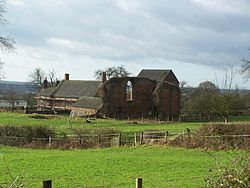Beauvale Charterhouse

The Structural Remains of Beauvale Priory in 2007
|
|
| Monastery information | |
|---|---|
| Full name | The Priory Church of the Holy Trinity, Beauvale |
| Other names | Beauvale Charterhouse |
| Order | Carthusian |
| Established | 1343 |
| Disestablished | 1539 |
| Dedicated to | Holy Trinity |
| People | |
| Founder(s) | Nicholas de Cantiloup, Lord of Ilkeston |
| Site | |
| Location | Beauvale, Nottinghamshire, England |
| Coordinates | 53°02′11″N 1°16′02″W / 53.036424°N 1.267206°WCoordinates: 53°02′11″N 1°16′02″W / 53.036424°N 1.267206°W |
| Public access | yes |
Beauvale Priory (also known as Beauvale Charterhouse) was a Carthusian monastery in Beauvale, Nottinghamshire. It is a scheduled ancient monument.
The priory was founded in 1343 by Nicholas de Cantelupe (d.1355), in honour of the Blessed Trinity. The priory was originally built to be home to a prior and twelve monks. It was the third of nine houses of the Carthusian order established in England. The two earlier houses were established in Witham Friary and Hinton in Somerset. The others were London Charterhouse, St. Anne's near Coventry, Kingston upon Hull and Mount Grace in Yorkshire, Epworth and Shene. The Valor Ecclesiasticus of 1534 lists the priory as having an annual income of £227 8s., of which £196 6s. was left after expenses. At this time the priory was in control of the advowsons of the churches of Greasley and Selston in Nottinghamshire; Bonby in Lincolnshire; and Farnham in Yorkshire.
Although concrete evidence remains scant, several claims have been made for Beauvale's role in shaping late medieval English spirituality: John P.H. Clark suggests that the author of the seminal mystical text The Cloud of Unknowing was likely a Carthusian of Beauvale Priory. and Jonathan Hughes posits that Beauvale may have been an important centre for the study of English mystic Richard Rolle.
Following England’s break from Rome, the Carthusians refused to accept King Henry VIII's supremacy over the church. Robert Lawrence, Prior of Beauvale, travelled to London in 1535 to see Thomas Cromwell in person in the hope of stopping the dissolution of his priory. Cromwell never saw Lawrence and he, along with two other Carthusian Priors who had made similar journeys, were imprisoned in the Tower of London as traitors. One of these was John Houghton, Lawrence's predecessor as Prior at Beauvale. Prior Lawrence was interrogated on 20 April but declared he could "not take our sovereign lord to be supreme head of the Church, but him that is by God the head of the Church, that is the bishop of Rome, as Ambrose, Jerome, and Augustine teach". The three Carthusians and a Brigittine monk from Syon Abbey were all tried on 28 April and charged with "verbal treason" for claiming King Henry was not the supreme head of the Church of England. The jury refused to find the four guilty as they felt "they did not act maliciously"; Cromwell, however, violently threatened the jury until they returned a guilty verdict.
...
Wikipedia

